
This is life for 3,000 Puerto Ricans still living in mainland US hotels
Every day is an adjustment for Liz Cruz and her family in this wintry, unfamiliar city, more than 1,..
Every day is an adjustment for Liz Cruz and her family in this wintry, unfamiliar city, more than 1,600 miles from home. The family, uprooted from storm-ravaged Puerto Rico in early December, has been living ever since at a Fairfield Inn & Suites in lower Manhattan. During their first hours in New York, they walked six miles in the cold to an East Harlem community center assisting displaced families. It took them two and half hours."These children have learned the meaning of sacrifice," said Cruz, who keeps a thick folder of paperwork chronicling her family's journey to the mainland from the northwestern Puerto Rican town of Isabela.Four months after Hurricane Maria pummeled the US territory, Cruz and her family are among more than 3,000 displaced Puerto Ricans living in hotels across 40 states in the mainland US, according to the Federal Emergency Management Agency. Their eligibility for transitional housing is re-evaluated every 30 days. And as they await longer-term housing, in rooms paid for by FEMA's Transitional Shelter Assistance program, their future here is uncertain."People are desperate," said Edwin Melendez, director of the Center for Puerto Rican Studies at Hunter College in New York. "These families will have to decide whether to stay or go back to Puerto Rico."
A 'zombie apocalypse without the zombies'
For most of the families, staying in Puerto Rico after Maria hit in September was not a feasible option.Much of the US territory still lacks electricity and running water. Nearly half a million customers remain without power, according to the electric power authority. In Maria's aftermath, food and supplies were scarce."I'd wake up every day not knowing how I was going to feed my children," said Cruz, 34. The storm hammered an island whose 3.4 million US citizens were already grappling with unemployment and poverty. Thousands were evacuated from the family's town when cracks were reported in the nearby Guajataca Dam after the hurricane. "It was literally the zombie apocalypse without the zombies," said Cruz's oldest daughter, Yadaliz Morales, 17.More than 170 people still live in nine shelters on the island, according to Puerto Rico's government. FEMA has put up nearly 900 others in hotels. 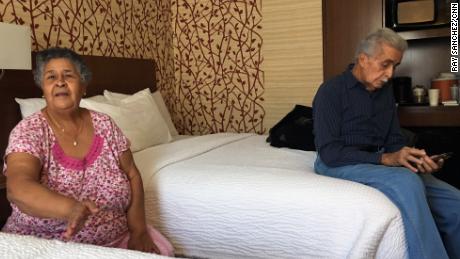 "Everything's been superlatives," said Mike Byrne, FEMA's federal coordinating officer, referring to the longest sustained distribution of food, fuel and water in agency history. "We've blown past every record for response that we've even had in any disaster."Meanwhile, several hundred thousands of Puerto Ricans remain in limbo in the mainland US, staying in shelters, in hotels or with relatives. And the island is expected to see a 19% cumulative decline in population over the next five years, according to government estimates.Many fleeing the devastation of Maria will end up in Florida, New York, Connecticut and Massachusetts in what experts say could be the greatest exodus to the mainland since the 1950s.
"Everything's been superlatives," said Mike Byrne, FEMA's federal coordinating officer, referring to the longest sustained distribution of food, fuel and water in agency history. "We've blown past every record for response that we've even had in any disaster."Meanwhile, several hundred thousands of Puerto Ricans remain in limbo in the mainland US, staying in shelters, in hotels or with relatives. And the island is expected to see a 19% cumulative decline in population over the next five years, according to government estimates.Many fleeing the devastation of Maria will end up in Florida, New York, Connecticut and Massachusetts in what experts say could be the greatest exodus to the mainland since the 1950s.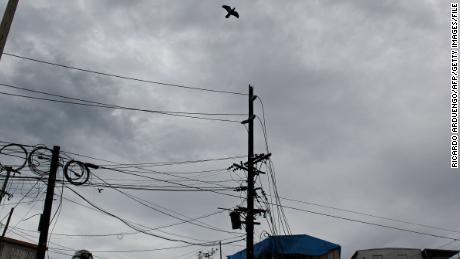 More than 10,300 Puerto Rican students have been enrolled in Florida school districts, according to a survey by Center for Puerto Rican Studies. Another 2,050 displaced Puerto Rican students have been enrolled in school districts in New York state, said Melendez, citing state education department figures.FEMA's shelter-assistance program is supposed to be a bridge to longer-term housing, which is already scarce in many cities taking in the newcomers. The program has been extended through March 20. "Housing is a complex problem and at this stage of the event, it's the biggest challenge," said FEMA's Byrne. "Nobody with a family wants to live in a hotel room."
More than 10,300 Puerto Rican students have been enrolled in Florida school districts, according to a survey by Center for Puerto Rican Studies. Another 2,050 displaced Puerto Rican students have been enrolled in school districts in New York state, said Melendez, citing state education department figures.FEMA's shelter-assistance program is supposed to be a bridge to longer-term housing, which is already scarce in many cities taking in the newcomers. The program has been extended through March 20. "Housing is a complex problem and at this stage of the event, it's the biggest challenge," said FEMA's Byrne. "Nobody with a family wants to live in a hotel room."
'I can't do this, mommy'
A handful of Puerto Rican families are living at the no-frills Fairfield Inn & Suites, near Chinatown in the shadow of the Manhattan Bridge. Its nondescript rooms have mini-fridges and microwaves. The families usually gather downstairs for the free breakfast buffet of scrambled eggs, bacon and sausage, coffee and juice. Milagros Bosse, a 32-year-old Marine Corps veteran, arrived in late December with her four young children.Bosse came from the municipality of Juncos in the central-eastern part of Puerto Rico. Her rental home was damaged by Hurricane Irma, which passed over the northern part of the island days before Maria. 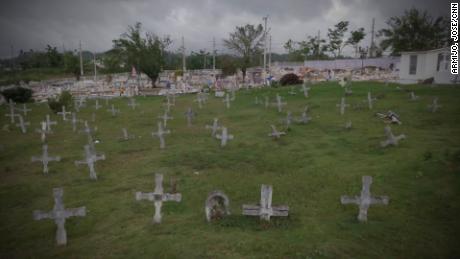 After Maria, Bosse said she slept with her children in the leaky living room of her mother's house. There weren't enough pillows or blankets. Meals consisted of cereal for breakfast, government-issue MREs for lunch and whatever they could scrounge up for dinner. There was no power. They boiled rainwater for drinking. One evening in early December, her 9-year-old daughter Taina — "the strongest one," according to Bosse — broke down. Darkness had set and the wind was howling. "I can't do this, mommy," Taina told her mother. "We need light. We need water. Why doesn't anyone care? Why can't we just live normal?"In tears, Bosse's mother implored her daughter to leave the island for the sake of the children. Relief organizations helped Bosse buy plane tickets to Miami, and family members rounded up money for an Amtrak train ride to New York.
After Maria, Bosse said she slept with her children in the leaky living room of her mother's house. There weren't enough pillows or blankets. Meals consisted of cereal for breakfast, government-issue MREs for lunch and whatever they could scrounge up for dinner. There was no power. They boiled rainwater for drinking. One evening in early December, her 9-year-old daughter Taina — "the strongest one," according to Bosse — broke down. Darkness had set and the wind was howling. "I can't do this, mommy," Taina told her mother. "We need light. We need water. Why doesn't anyone care? Why can't we just live normal?"In tears, Bosse's mother implored her daughter to leave the island for the sake of the children. Relief organizations helped Bosse buy plane tickets to Miami, and family members rounded up money for an Amtrak train ride to New York.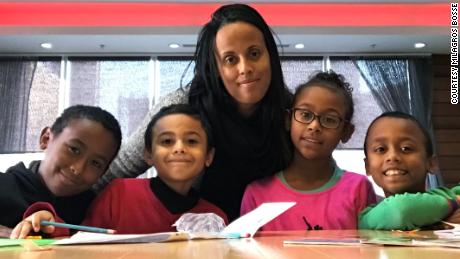
'We are safe. We are warm'
Low on cash after staying at a hostel for more than a week, Bosse applied for FEMA's transitional shelter. The family checked into the Manhattan hotel just days before Christmas, she said. "The kids didn't care there were no presents," Bosse said. "There was no tree. All they cared was that we have light. We have water. We are safe. We are warm."At the hotel, she and her children share a pair of queen-sized beds. The lights stay on at night because Taina dreads the dark. The girl and her siblings — 11-year-old Tron, 8-year-old Terence and 7-year-old Julian — recently started school in Manhattan. Their book bags, notebooks and pencils were donated. Hotel workers gave them clothing. 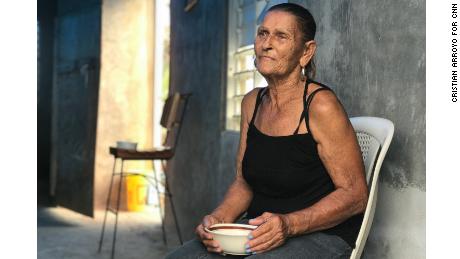 Bosse said she hopes to rent an apartment through a federal program for homeless veterans. Their stay at the hotel runs out on Valentine's Day. In the Fairfield Inn & Suites cafeteria, where the displaced families eat breakfast, Bosse helps her kids with homework. "They like the routine," she said. "I try to make it as normal for them as possible." Bosse looks for work when the children are at school. She also helps the hotel housekeeper vacuum and make the beds. "I miss having a home and doing little things," she said. "I miss cleaning, cooking and washing dishes."On New Year's Eve, she tucked the children in early but nudged them awake at midnight. "I kissed them and thanked god for allowing us to be here," she said.
Bosse said she hopes to rent an apartment through a federal program for homeless veterans. Their stay at the hotel runs out on Valentine's Day. In the Fairfield Inn & Suites cafeteria, where the displaced families eat breakfast, Bosse helps her kids with homework. "They like the routine," she said. "I try to make it as normal for them as possible." Bosse looks for work when the children are at school. She also helps the hotel housekeeper vacuum and make the beds. "I miss having a home and doing little things," she said. "I miss cleaning, cooking and washing dishes."On New Year's Eve, she tucked the children in early but nudged them awake at midnight. "I kissed them and thanked god for allowing us to be here," she said.
Watching cartoons and checking Facebook
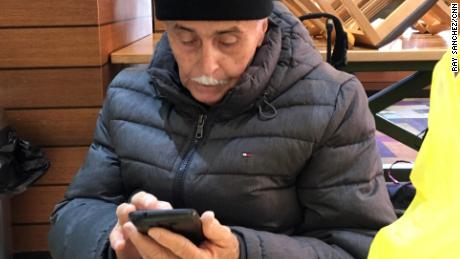 In a second-floor room at the Fairfield Inn & Suites, Bienvenido Ramirez, 77, sometimes makes pork sausage soup for him and his wife, Lucia Alicea.He microwaves water til it's piping hot, then drops in noodles, garlic, onion, salsa, cilantro and sausage. Then he microwaves it some more.He and his wife, 71, arrived in New York on December 7 from the southern Puerto Rican coastal town of Lajas. At the San Juan airport the day they left, 19 other people from their neighborhood were taking flights to the mainland, he said.Ramirez, who once lived in New York for five years, said their flight was paid for by longtime friends from an East Harlem church he once attended. His friends are concerned about his health. He walks with a cane after knee surgery left him with a pinched nerve. A pacemaker implanted more than a decade ago needs to be replaced."I'd like to stay in New York until I get these health issues resolved," he said. Alicea rarely leaves the hotel because of the cold. To pass the time, she has taken to watching cartoons. "The hurricane has taken me back to my infancy," she said. "I can't complain. The hotel staff has been good to us. We have a room and breakfast." On his phone, Ramirez plays old music from the island. He also spends time on Facebook, reading posts from neighbors and friends back in Lajas. "That's how I stay on top of everything happening back home," he said.
In a second-floor room at the Fairfield Inn & Suites, Bienvenido Ramirez, 77, sometimes makes pork sausage soup for him and his wife, Lucia Alicea.He microwaves water til it's piping hot, then drops in noodles, garlic, onion, salsa, cilantro and sausage. Then he microwaves it some more.He and his wife, 71, arrived in New York on December 7 from the southern Puerto Rican coastal town of Lajas. At the San Juan airport the day they left, 19 other people from their neighborhood were taking flights to the mainland, he said.Ramirez, who once lived in New York for five years, said their flight was paid for by longtime friends from an East Harlem church he once attended. His friends are concerned about his health. He walks with a cane after knee surgery left him with a pinched nerve. A pacemaker implanted more than a decade ago needs to be replaced."I'd like to stay in New York until I get these health issues resolved," he said. Alicea rarely leaves the hotel because of the cold. To pass the time, she has taken to watching cartoons. "The hurricane has taken me back to my infancy," she said. "I can't complain. The hotel staff has been good to us. We have a room and breakfast." On his phone, Ramirez plays old music from the island. He also spends time on Facebook, reading posts from neighbors and friends back in Lajas. "That's how I stay on top of everything happening back home," he said. 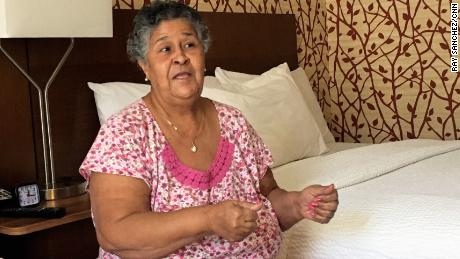 The couple stayed with friends in East Harlem for a few days before moving to the hotel, where they socialize with other displaced families. "We have gotten to know each other here," Alicea said. "We sit for breakfast and listen to what others went through. It brings us closer."
The couple stayed with friends in East Harlem for a few days before moving to the hotel, where they socialize with other displaced families. "We have gotten to know each other here," Alicea said. "We sit for breakfast and listen to what others went through. It brings us closer."
'Why do we have to be treated like this?'
Liz Cruz is fearful about her family's future. She worries about the children. Her daughter, Yasmin Morales, 13, broke down during a snowstorm earlier this month, sobbing uncontrollably in the modest room she shares with two older siblings. "This is Hurricane Maria all over again," she told her mother."My children are still traumatized," Cruz said. Her three teen-age children recently started school in New York. Her 79-year-old father and his wife are living in another room at the hotel.She and her oldest daughter recently visited a government office to apply for food stamps. Her daughter Yadaliz attempted to translate. The caseworker, frustrated by the language barrier, told them, "I don't want this case."FEMA has extended their hotel stay through February 14. But what happens after that is unclear. Her daughter Yadaliz requires regular monitoring for a heart and thyroid condition, she said. And Cruz learned last week that her son Kryss, 14, has the flu.FEMA won't discuss individual cases. But it's possible the family could be forced out on the street."Why do we have to be treated like this?" Cruz said, her eyes misting with tears. "We just want a roof over our heads. I want to work. I want my children to have what they need."
Original Article

